- Home
- Edward Lee
In the Year of Our Lord 2202 Page 4
In the Year of Our Lord 2202 Read online
Page 4
“You performed the scan yourself?”
“No, sir. Since the incident was classified, I couldn’t participate. I lack the sufficient clearance. Furthermore, and because of that, I didn’t even know what happened until Major-Rector Matthew briefed me a few moments ago. The person who performed the autopsy was my adjutant, Warrant Officer Simon.”
Luke’s stern eyes searched his holoscreen for any indication that Esther was lying. He found none. “Warrant Officer Simon. Explain to me how a standard post-mortal scan could fail to detect a bomb hidden in a dead man’s belly?”
Simon was short, skinny, awkward looking. Sweat ran down his bald head like lines of glycerin. “I-I don’t know, sir.”
“You’re an expert medical tech with a high security clearance, and you don’t know?”
“I’m s-sorry, sir, I don’t know.”
“That’s great. Then tell me why wasn’t an actual physical autopsy performed? Why wasn’t the body y-sectioned and directly examined?”
Now sweat dripped off Simon’s brows, plipping to the floor. “Cause of death was clear. It was my professional opinion that a physical autopsy wasn’t necessary.”
“Uh-hmm. Or perhaps you’re a Red Sect infiltrator who helped this terrorist sneak on board, knowing that he possessed a bomb.”
Simon looked like he was about to keel over. But then Tom spoke up: “Sir, if I may? I can easily explain why—”
General-Vicar Luke’s hard eyes snapped to Tom. “Shut up, Private. You’re a profane indecorous punk with a demerit list longer than the keel of this ship. You’ll get your chance to talk, but until then keep your foul mouth shut.”
Matthew leaned down to the mission commander’s ear. “Sir, I’m well aware of the private’s record, but he is a soldier of some experience. It might be prudent to hear what Private Thomas has to say.”
Luke grumbled, then redirected his frown back to Tom. “Talk.”
“I’ve seen this sort of thing before, sir,” Tom said, “during some joint operations with Federate Intelligence. It’s a favorite ploy of the Red Sect. They’d ingest these RDX charges that they’d deliberately encase in de-radiated tritium covered by an electron-negative polymer. This would allow them to walk right over a bomb-magnometer without triggering an alarm; that’s how their suicide operatives have been able to get past our security stations at churches, courthouses, Federate buildings, and the like. A medical tomegraph is based on the same technology as most of our public mag-units. That’s why the autopsy scan didn’t detect the RDX charge in the dead guy’s gut.”
The General-Vicar seemed to consider this.
Sharon explained the rest. “The bomb was only detectable for a few moments, sir—when its primer-charge was activated via a discreet timer. That’s when Private Thomas’ electrostatic alarm went off.”
The Missions Commander nodded minutely. “I thought you were a navigational systems operator. What were you doing in a restricted property vault?”
Sharon knew she had to be careful how she answered. She wouldn’t want to lie anyway. She chose her words carefully. “I was walking down the central manway, sir, when I noticed Private Thomas standing guard before the unit. I’d never known him personally, but I had seen him for the first time earlier in the shift when he responded to the milliwave attack at my office.”
“Go on.”
“While I was conversing with him, his electrostatic alarm went off. He gave me the option of evacuating the area, but I chose to enter the unit with him. I thought I might be able to help him render the bomb safe.”
General-Vicar Luke’s eyes held on his holoscreen, waiting for the program to register a lie. None came.
“It was Private Thomas’ bravery and expertise that allowed him to locate the bomb so quickly, sir,” Sharon added.
Then Tom kicked in, “And it was Spec Sharon’s foresight to prep the waste disposal system in advance. If she hadn’t done that, the bomb would’ve detonated before we could eject it.”
Luke’s fingers stroked the cloven chin as he continued to watch the lie-detection program. “How do you like that? Everyone’s telling the truth. Esther, Simon. You’re both dismissed. Carry on with your duties, and may God be with you.”
“And also with you, sir,” the two medical techs said in unison. They saluted and left.
“The Christian Federate is proud of you both,” Matthew said to Sharon and Tom. “You’re brave Christian soldiers.”
“Yes,” the Mission Commander agreed. “And God said: ‘Behold, I come quickly.’ I’m promoting each of you one grade in rank.”
“Thank you, sir,” Tom and Sharon said at once. Luke tossed a hand. “And a three-day pass for each of you.”
“I appreciate your generosity, sir,” Sharon said. “But I don’t need a pass. I live to serve the Lord.”
“Very well.” Then Luke looked up at Tom.
“I live to serve the Lord too, sir,” Tom said. He shrugged. “But I’ll take the pass.”
(II)
In the United States’ presidential and general elections of 2049, a reform party popularly known as the Christian Coalition had swept the House, the Senate, and the Oval Office. Forty years of war, crime, corruption, and an overall devolution of morality caused a social outcry from the few Americans who still voted (only thirty million by that time). Popular demand changed things very quickly. Just as the Founding Fathers had provided for the Constitution to change as society changed, the new government proposed many changes for its populace, and soon thereafter, the 60th Amendment redefined the fundamental law of the nation’s federal system. Where previous centuries had ensured the separation of church from state, the two-thirds majority ratification joined church with state. Ten states immediately seceded from the Union—they were allowed to. Members of non-Christian denominations were deported to the country of their choice. Jews, in particular, relocated to Israel, which now encompassed most of the former Middle East after the Cold Fusion War. Reproduction out of wedlock was criminalized. A Christian educational base became compulsory. New technology polygraphs replaced jury trials, ending ninety-six percent of violent crime in a single presidential term via summary execution and a disposal of the lst-through-7th Amendments. Next came the Eugenics Act, which mandatorized in vitro fertilization. Once children reached puberty, they were sterilized but only after sperm and egg samples were inventoried in the national cryolization depository; hence, when couples properly married and wished to have children, the respective egg and sperm were retrieved and joined in vitro, then the fertilized egg was implanted into the wife’s womb. Within several decades, advancements in genetic screening enabled this process to screen out genetic defects in the fertilized egg, as well as hereditary propensities for all manner of disease.
Public health conditions skyrocketed. The economy bloomed exponentially. Poverty disappeared.
So did freedom but no one cared.
««—»»
Over time, other countries sought to join this new explosively successful governance: Canada, much of South and Central America, much of Europe. A succession of popular elections officially acknowledged this transcontinental political merger as the Christian Federate. One-and-a-half-billion Roman Catholics voted the Pope into the office of president, replaced all houses of representatives with the Synod of Bishops, and all likenesses of the senatorial branch became the Sacred College of Cardinals. Vatican City was now not only the seat of religious power over most of the world, it was the seat of political power—that is, until the year 2080, when a well-coordinated Red Sect nuclear attack had reduced this domain to a wasteland, to the tune of half a gigaton’s worth of ordinance supplied to the Sect by the nation now known as the Alliance of Southern China. Though the Red Sect members involved were never apprehended, most of the Alliance of Southern China was obliterated a week later, by the Christian Federate’s Satellite Defense Initiative.
To the tune of fifty gigatons.
The Synod elected a new Pope, and the Va
tican was moved to the former Washington, D.C.
Since then—with the exception of minor terrorist cells—global peace ensued. Accelerated discoveries in inorganic transfection techniques allowed science to create new artificial compounds by manipulating molecular bond structures in metalloids and rare earth elements, materials that conducted no heat, materials that deflected radiation, and materials stronger than titanium but nearly weightless were easily manufactured. Cold-fusion-based generators powered the entire Federate with mere water. Magnetic-field-levitation engines circumvented the laws of gravity. Genetic crop hybridization fed the world. Simple “nuclear-drag” techniques launched humankind into outer space at .444 the speed of light.
All in the name of God.
(III)
Was the sign new? It was right below the ID plaque for the women’s dom wing. How could I not have noticed that? Sharon thought. After two days underway? “Bless me, Jesus, your unworthy servant,” she whispered to the benevolent visage. As if to answer, the mid-shift blessing flowed from the intercom:
“‘Let judgment run down as waters, and righteousness as a mighty stream. Blessings are upon the heads of the just.’”
Thank you for your blessing, my Lord, she thought, all the while slightly irritated by the new regs that allowed the Chaplain’s Unit to mix up scripture. Amos? She guessed, and Proverbs? She was getting rusty. It wouldn’t hurt her to attend a study group soon.
The lumeplates engaged when she entered her dom. Do—not—despair, she forced the thought. Kim’s bunk and locker had already been stripped. “She’s with God now.” She snapped on her holomirror, immersed herself in the next task. She’d been promoted twice today; she wanted to wear her new rank—Spec 6—when she went to the galley. She entered the tiny lav, then quickly stripped off her tech utilities and fed the one-piece valcron garment into the reprocessing chute. The multiple jets of the vapor shower refreshed her, the cool sublimation of verapropyl betaine caressing her body. The grim ponderings of the day seemed to wash away with the spray: the corpse in the morgue.
ABZ Genotype Syndrome. A Red Secter…
She shivered at the terrible scarlet image.
The demon’s face.
Kilukrus, she thought.
Twice today she’d nearly been killed.
Thanks be to God. My comforter and protector. My friend.
The vapor shower hissed on, licking her skin. The Seaton Tech Academy had trained her well in the mentalistic blocks. Without a flinch, she ignored the tiny sensations when the rover nozzles ran up the slit of her sex. She rejected any sexual thought when her nipples distended. Just a tactile reaction, she reminded herself.
The vapor sucked out of the shower cell when she hit the exhaust tab. Next, she walked nude across the lav, appraised herself in the holomirror. She’d developed late: small white breasts and a narrow pelvic span. She was lean, long, and her short honeyish hair glowed healthily. Back at the Academy, she often felt insecure when she glimpsed the other girls naked. Their larger breasts and pert nipples seemed robust; their curvaceous body lines seemed more desirable. But as she matured, she discarded these notions as trifling and even sinful. The beauty of the body was as diverse as the beauty of a garden. Each flower different but beautiful, nonetheless. My body is a temple of the Lord, and all that God makes is a thing of beauty.
Her freshly reprocessed fatigues were hanging for her, her new Spec 6 insignias imbued in black on the sleeves. She was about to put them on when she heard her flagtone go off. Maybe I SHOULD have taken that three-day pass, she wondered, but when she walked back into the dom she found her holoscreen unblinking.
Of course, she realized. It wasn’t her flagtone at all; it was Kim’s.
The death report must not have been processed yet. Sharon switched on her ex-dom-mate’s intranet screen, just to make sure it wasn’t anything important that needed to be reported to whomever took over command of the Data Regiment.
MOS WORK CALL
DATA REGIMENT/ANALYSIS TECHNICIAN
Priority Code: NON-URGENT
Re: MADAM and ESA-2 Photospectroscopy Probe Order
De: Data Reg c/o Security Corp
READ: Elemental Probe detects Target-Object (exterior) as programmed. Target-Object composition results: Molecular scan reveals geometric structure of silicate of sodium & aluminum, a pyroxene compound.
ORDERS: File & Store for Analysis
STOP
Sharon took it unto herself to touch the FILE & STORE icon. Silicate of sodium and aluminum, she recited to herself. A pyroxene compound. She made neither heads nor tails of the electronic missive. Kim had been the regiment’s analysis tech, a rather dull occupational specialty which entailed little more than rerouting analysis transmissions into the Edessa’s Macro-Analysis Computer. MADAM was one of the ship’s long-range sensors (for Mass-Activated Detection and Alarm Mechanism), much like the old-time radar systems, only this worked in space. The MADAM would alert the ship’s guidance systems of unanticipated obstructions, such as asteroids and sundry space debris—its main onboard function—but it was also used to uplink to other sensor mechanisms such as…
ESA-2, she recognized. The latest extra-solar array.
This was the Federate’s largest radio-telescope, several square miles in surface area, which was being used to detect new planets and analyze aspects of their composition. The frustrating thing about Kim’s job—as was also the case with Sharon’s—was that they would spend their entire shifts filing data reports that they knew nothing about. Of course, she realized that she had no official “need to know” and that was how it should be. It kept the ship’s operations secure.
Still, it pricked her curiosities at times.
Just some boring compositional scan, she deduced and closed the flagtone’s window. Even though she and Kim had never really been friends, it gave Sharon a good feeling to have carried out Kim’s last duty order for her.
She was about to turn off the screen when she noticed a far icon. PERSONAL DATA. Most of the Privacy Acts had been repealed but the Federate did allow each member of the Exploratory Corp to have a separate directory in their computers to store personal information. Sharon didn’t even use hers—she scarcely had a need.
But—
She didn’t see any harm in looking at Kim’s data. Kim was in heaven now.
I should’ve known, she thought at once.
The first file was nothing but an index of male names and commsigns. There were dozens of them.
Sharon had realized all along that Kim wasn’t keeping her celibacy vows; she’d overheard many of her conversations with secret male suitors. And even though this was a clear violation of Federate protocol, Sharon never reported it—nor would she report this list. Only God can judge, she reminded herself.
She quickly closed the file. Then—
A second file read MISC.
Sharon opened it, expecting simple personnel info or favorite verses—
What is… THIS?
—but found something else altogether.
The screen filled with bright, edgy movement—a cyberfile. The small three-dimensional image seemed to be alive in the air.
A hitch gathered in Sharon’s chest, a sensation unlike anything she’d ever experienced. On the screen, two naked men took turns fornicating with a woman who was stretched back across a lev-slat. The woman was naked, flushed. Anxious sighs escaped her lips.
The woman was Kim.
Oh…my…
Even without ever having seen an example, Sharon knew at once what she was looking at: pornography.
And this she could not overlook. Possession of ungodly and/or lewd imagery violated the Federate’s felony statutes. Kim would be posthumously demoted, and her obit records would reflect the felony charge. Sharon hated to do it, but this was too much.
But when her finger raised to close the file—she couldn’t do it.
Her eyes held to the image.
The men must be civilians or non-fed con
tractors: they weren’t bald. One man—with coal-black hair— pushed Kim’s knees all the way back to her bosom, accelerating the pace of his fornication. The second man was—
Sharon recoiled. It was the most offensive thing she’d ever seen. It was ugly, wretched, and evil. With gritted teeth she turned the awful images off, then turned around…and screamed.
There was a figure in the room.
(IV)
Jesus extended His hand toward Major-Rector Matthew. Beneath Christ’s feet was the flag of the Christian Federate, under which read:
BLESSED ARE THE MEEK,
FOR THE MEEK SHALL INHERIT THE EARTH.
It was just another Morale Department poster, of course, but it made Matthew wonder. Indeed, the Christian Federate had inherited much of the world…but meek?
How meek were we when we nuked Iran and Iraq? he asked himself. How meek were we when we mag-fielded the Army of the Ukraine and starved them into surrender, or when we EMP-bombed all the power stations in Yugoserbia during the middle of winter?
Not very meek.
But the Security Corp commander didn’t question his orders. Sometimes the Lord God was a god of anger and vengeance. Matthew supposed it all became justified in the end.
Still, he wondered.
This mission, for instance. Earlier, when he’d led a group of securitechs to check the cargo bays, he’d discovered something rather odd. Yes, they’d found a small storage warren with a shimmed lock, obviously the overlooked cranny in which the Red Sect infiltrator had stowed away—the DNA scans proved it. But that wasn’t the odd thing.
All the main cargo bays were empty.
A resupply mission? he thought. With no supply inventory?
This was just one of many things that rubbed Matthew the wrong way. All of the data-retrieval units were running hot; cyphers by the dozens were being received, but Matthew didn’t have the clearance to read them. Add to that, the Decryption Unit was off line entirely; no technical staff ever boarded. And add to that—

 In the Year of Our Lord 2202
In the Year of Our Lord 2202 The Minotauress
The Minotauress Terra Insanus
Terra Insanus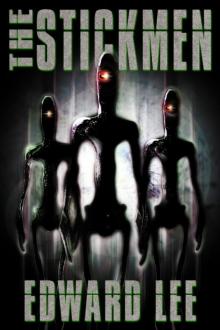 The Stickmen
The Stickmen Flesh Gothic by Edward Lee
Flesh Gothic by Edward Lee Family Tradition
Family Tradition You Are My Everything
You Are My Everything The Backwoods
The Backwoods The Teratologist
The Teratologist Smoke and Pickles
Smoke and Pickles Buttermilk Graffiti
Buttermilk Graffiti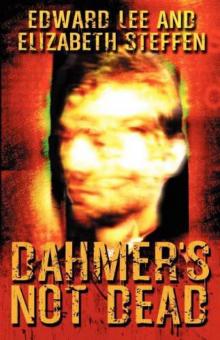 Dahmer's Not Dead
Dahmer's Not Dead Quest for Sex, Truth & Reality
Quest for Sex, Truth & Reality The Innswich Horror
The Innswich Horror Brides Of The Impaler
Brides Of The Impaler Goon
Goon Trolley No. 1852
Trolley No. 1852 Sacrifice
Sacrifice Monster Lake
Monster Lake Succubi
Succubi Lucifer's Lottery
Lucifer's Lottery Monstrosity
Monstrosity The House
The House The Dunwich Romance
The Dunwich Romance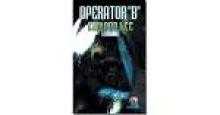 Operator B
Operator B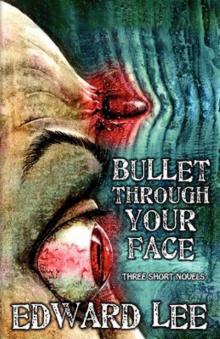 Bullet Through Your Face (improved format)
Bullet Through Your Face (improved format) Grimoire Diabolique
Grimoire Diabolique Room 415
Room 415 The Messenger (2011 reformat)
The Messenger (2011 reformat) Incubi
Incubi The Black Train
The Black Train House Infernal by Edward Lee
House Infernal by Edward Lee City Infernal
City Infernal Creekers
Creekers The Haunter Of The Threshold
The Haunter Of The Threshold Mangled Meat
Mangled Meat The Doll House
The Doll House Header 2
Header 2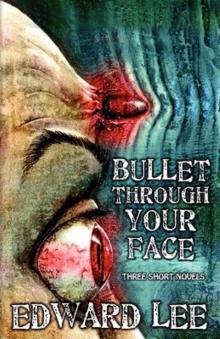 Bullet Through Your Face (reformatted)
Bullet Through Your Face (reformatted)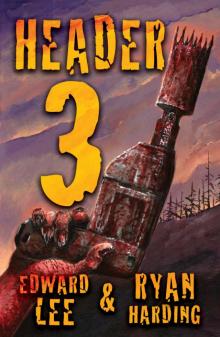 Header 3
Header 3 Infernal Angel
Infernal Angel Pages Torn From a Travel Journal
Pages Torn From a Travel Journal Edward Lee: Selected Stories
Edward Lee: Selected Stories The Bighead
The Bighead The Chosen
The Chosen